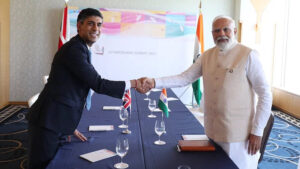G7 Urges China to Exert Pressure on Russia for an End to the Ukraine War
The G7’s Call for Chinese Intervention and Constructive Relations
The Group of Seven (G7) wealthy democracies have taken a united stand, urging China to utilize its influence over Russia to bring an end to the ongoing war in Ukraine while promoting peaceful resolutions to territorial disputes. This call for an action from China has sparked a strong response from Beijing.
In a joint statement, the G7 leaders emphasized their desire to maintain the constructive and stable relations with China, acknowledging the significance of open and direct communication to express their concerns. They called upon China to exert pressure on Russia, urging an immediate, complete, and unconditional withdrawal of Russian troops from Ukraine. Additionally, they encouraged China to actively support a comprehensive, just and lasting peace based on the principles outlined in the United Nations Charter, including engaging in direct talks with Ukraine.
The Importance of Cooperation and Engagement with China
Recognizing China’s global influence and economic prominence, the G7 stressed the need for collaboration with China on various challenges, such as climate change, biodiversity, the financial needs of vulnerable countries, global health, and economic stability. They emphasized the importance of working together to address these pressing issues.
Concerns over China’s Actions in the East and South China Seas
Despite their call for cooperation, the G7 leaders expressed serious concerns about China’s activities in the East and South China Seas. They voiced apprehension over Beijing’s expansion of military presence and its assertiveness in self-governed Taiwan, even resorting to threats of force. The G7 leaders called for a peaceful resolution to the long-standing issue of Taiwan’s status and rejected China’s expansive maritime claims in the South China Sea. Furthermore, they opposed China’s militarization efforts in the region.
Addressing Human Rights Concerns in China
The G7 statement also highlighted concerns regarding human rights violations in China, focusing on Tibet, Hong Kong, and the Xinjiang region. Of particular concern is the issue of forced labor in Xinjiang. The G7 leaders expressed their commitment to addressing these human rights issues and advocating for the protection of fundamental rights.
Clarifying Intentions and Countering Misconceptions
Addressing allegations that the G7 seeks to hinder China’s rise as a global power, the joint statement emphasized that their policy approaches are not intended to harm China or impede its economic progress and development. Instead, they aim to promote a rules-based international order. The G7 leaders stressed that efforts to diversify manufacturing supply chains and ensure stable access to critical resources are not aimed at severing trade ties with China. Rather, they aim to enhance economic resilience and reduce excessive dependencies in critical supply chains.
Balancing Cooperation and Criticism
The G7’s call for China’s intervention in the Ukraine conflict showcases their commitment to resolving global issues through diplomacy and collaboration. While highlighting areas of concern, such as territorial disputes and human rights, the G7 seeks to strike a balance between constructive engagement and addressing contentious issues. The joint statement emphasizes the importance of open dialogue and cooperation while maintaining a principled stance on matters of international importance.
In conclusion, the G7’s call for China to exert pressure on Russia for an end to the Ukraine war represents a significant diplomatic effort to resolve the conflicts peacefully. The statement underscores the G7’s commitment to constructive relations with China while addressing concerns about the territorial disputes, human rights, and a rules-based international order. By emphasizing cooperation and engagement, the G7 aims to foster global stability, promote shared values, and advance the well-being of nations worldwide.




Average Rating